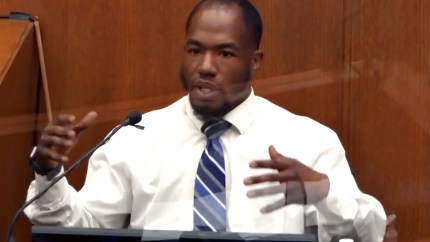Categorical clemency is needed to address systemic racism and injustice
OPINION: Categorical clemency is a step toward acknowledging the categorical way the Black community has been targeted and harmed by the mass incarceration system.

Editor’s note: The following article is an op-ed, and the views expressed are the author’s own. Read more opinions on theGrio.
Black History Month is dedicated to celebrating the achievements of Black people despite the odds. While the achievements should be commemorated, “the odds” must be acknowledged. Often the achievement was to overcome seemingly insurmountable obstacles, one of the largest today being the shackling of people through the mass incarceration system. Reliance on criminalization rather than investing in social programs on the preventative side has made America No. 1 in the world in the worst possible measure: incarceration.
As a criminal defense lawyer, I sat in the homes of people overcharged with crimes explaining to them and their families the bleak prospects of successful outcomes in a system with an insatiable appetite to imprison Black people.
There are certain moments that stick with me as reminders of the harm this system causes. Like the time I had to explain to the father and mother of a young Black man that their 21-year-old son would likely spend the rest of his life in prison because he was charged in a conspiracy with people he did not even know. Or the time I had to tell a client who was the mother of a young child that she was facing 20 years in prison because the government believed she had information about her partner that she did not have.
Then there are the haunting images and sounds of young Black people struggling to move through the courtroom in shackles, reminding me of the unbroken line between America’s chattel slavery and today’s mass incarceration system. This kind of dehumanization of Black people in a public, government system epitomizes the vastness of the harm to us all.
One in five Black men born in 2001 is likely to experience imprisonment within their lifetime. Despite comprising roughly 13% of the population, Black people make up 38% of the incarcerated population. Black people are victims of police misconduct in over half of wrongful murder convictions. A 2020 study showed unarmed Black people are killed at three times the rate of white people. And Black people are more likely to be stopped and searched by police than other groups. Americans must either admit that its mass incarceration system is steeped in racism and must be reformed or admit that they believe Black people are more criminal.
For sure, there are many remedies that need to be instituted both on the front side and on reentry on the backside. These are investments in long-term solutions, not piecemeal reforms that do little to improve safety while keeping Black people disproportionately locked up. These investments take time to yield results — a fact that those opposed to change use to argue that reform is not possible or will not work. It will take some time to undo the tremendous harm caused by the mass incarceration system, but reform the system we must.
Crime
In the need for time, there is a glimmer of hope for immediate results: clemency. When Alexander Hamilton suggested the need for the power of clemency, he wrote justice would be too “sanguinary and cruel” without it. Indeed, Mr. Hamilton was right. The blood of many Black people has been shed by the mass incarceration system, and it is indeed a cruel system.
Clemency, from its inception, was meant to prevent, or at least alleviate, the harm we see today. It is the unfettered authority of an executive to grant relief from draconian punishment. While many think of the use of clemency on a case-by-case basis, categorical clemency can be used to remediate harm in the same sweeping way it was caused. The ACLU, through its Redemption Campaign has called and continues to call for the categorial use of clemency power by the president and governors.
Granting categorical clemency means commuting the sentences of certain groups of people unfairly targeted by extremely harsh sentences and who — if convicted under current law — would serve lesser sentences than they are now serving. This would signal an evolution in our thinking about the mass incarceration system.
Granting categorical clemency to people convicted of drug-related offenses would reflect that we believe punishment is not the only aim of the system, that redemption too, is a worthy goal. Granting categorial clemency to disabled people and the elderly would signal that we do not believe that people are disposable, that we got it wrong when we sent a 21-year-old to prison for life in a drug conspiracy case. Granting clemency to those incarcerated for technical probation or parole violations would reflect that we believe that reentry support should be part of the system.
Categorical clemency is a step toward acknowledging the categorical way the Black community has been targeted and harmed by the mass incarceration system. The harm is both historical and contemporary; Starting in 1619, enshrined in the Exception Clause of the 13th Amendment in the U. S. Constitution, exacerbated by the delay in fulfillment of the Emancipation Proclamation, modernized through the war on drugs, and perpetuated in perpetuity through the myriad collateral consequences of convictions and racially disparate treatment in all parts of the mass incarceration system. Categorical clemency would acknowledge the delayed fulfillment of the promises of freedom and equality.
Categorical clemency would be a step toward redemption for America.

Cynthia W. Roseberry is the Acting Director of the ACLU’s Justice Division, where she leads the ACLU’s political advocacy to reform the criminal legal system. Ms. Roseberry is a former public defender and served as the executive director of the Federal Defenders of the Middle District of Georgia, Inc. She also managed Clemency Project 2014.
TheGrio is FREE on your TV via Apple TV, Amazon Fire, Roku, and Android TV. Please download theGrio mobile apps today!








